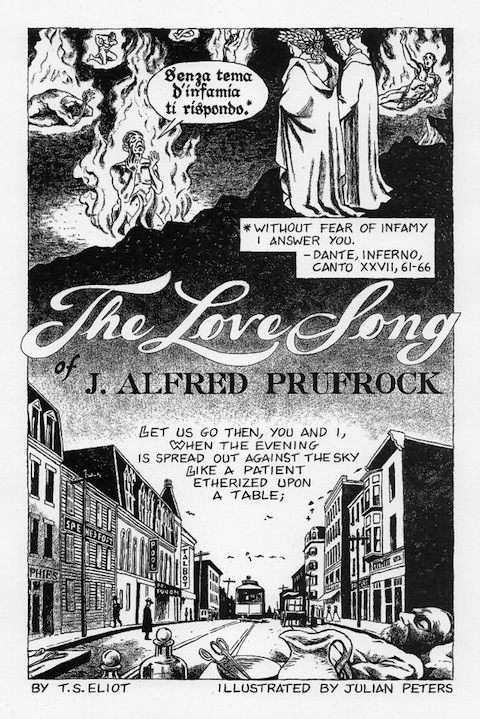
Poetry is as close as written language comes to the visual arts but, aside from narrative poems, it is not a medium easily adapted to visual forms. Perhaps some of the least adaptable, I would think, are the high modernists, whose obsessive focus on technique renders much of their work opaque to all but the most careful readers. The major poems of T.S. Eliot perhaps best represent this tendency. And yet comic artist Julian Peters is up to the challenge. Peters, who has previously adapted Poe, Keats, and Rimbaud, now takes on Eliot’s “The Love Song of J. Alfred Prufrock,” and you can see the first nine pages at his site.
Written in 1910 and published five years later, “Prufrock” has become a standard reference for Eliot’s doctrine of the “objective correlative,” a concept he defines in his critical essay, “Hamlet and His Problems,” as “a set of objects, a situation, a chain of events which shall be the formula of that particular emotion.” It’s a theory he elaborates in “Tradition and the Individual Talent” in his discussion of Dante. And Dante is where “Prufrock” begins, with an epigraph from the Inferno. Peters’ first page illustrates the agonized speaker of Dante’s lines, Guido da Montefeltro, a soul confined to the eighth circle, whom you can see at the top of the title page shown above. Peters’ visual choices place us firmly in the hellish emotional realm of “Prufrock,” a seeming catalogue of the mundane that harbors a darker import. Peters gives us no hint of when we might expect new pages, but I for one am eager to see more.
via The Rumpus
Related Content:
Hear Gertrude Stein Read Works Inspired by Matisse, Picasso, and T.S. Eliot (1934)
Josh Jones is a writer and musician based in Durham, NC. Follow him at @jdmagness


Awesome read.